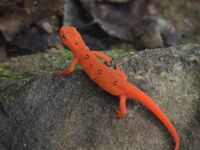Eastern Red Spotted Newt: Difference between revisions
Jump to navigation
Jump to search
| Line 1: | Line 1: | ||
[[File:Newt.jpg|200px|thumb|right|An Eastern Newt (Eft stage)]] | |||
=Eastern Red Spotted Newt= | =Eastern Red Spotted Newt= | ||
The Eastern Red Spotted Newt (Notophthalmus viridescens viridescens) is a salamander native to Eastern North America (Dec). It is a common amphibian (raritan), which means it is cold-blooded (DEC) and can be found in wet forests, small lakes, streams and ponds (portal). They frequently switch between aquatic and terrestrial habitats throughout their lives. They have 4 distinct life cycles which they are able to switch between based on their environment. The stages are 1) egg, 2) aquatic larva, 3) eft (terrestrial adult) and 4) newt (aquatic adult) (DEC). | The Eastern Red Spotted Newt (Notophthalmus viridescens viridescens) is a salamander native to Eastern North America (Dec). It is a common amphibian (raritan), which means it is cold-blooded (DEC) and can be found in wet forests, small lakes, streams and ponds (portal). They frequently switch between aquatic and terrestrial habitats throughout their lives. They have 4 distinct life cycles which they are able to switch between based on their environment. The stages are 1) egg, 2) aquatic larva, 3) eft (terrestrial adult) and 4) newt (aquatic adult) (DEC). | ||
Revision as of 09:42, 11 May 2022

Eastern Red Spotted Newt
The Eastern Red Spotted Newt (Notophthalmus viridescens viridescens) is a salamander native to Eastern North America (Dec). It is a common amphibian (raritan), which means it is cold-blooded (DEC) and can be found in wet forests, small lakes, streams and ponds (portal). They frequently switch between aquatic and terrestrial habitats throughout their lives. They have 4 distinct life cycles which they are able to switch between based on their environment. The stages are 1) egg, 2) aquatic larva, 3) eft (terrestrial adult) and 4) newt (aquatic adult) (DEC).